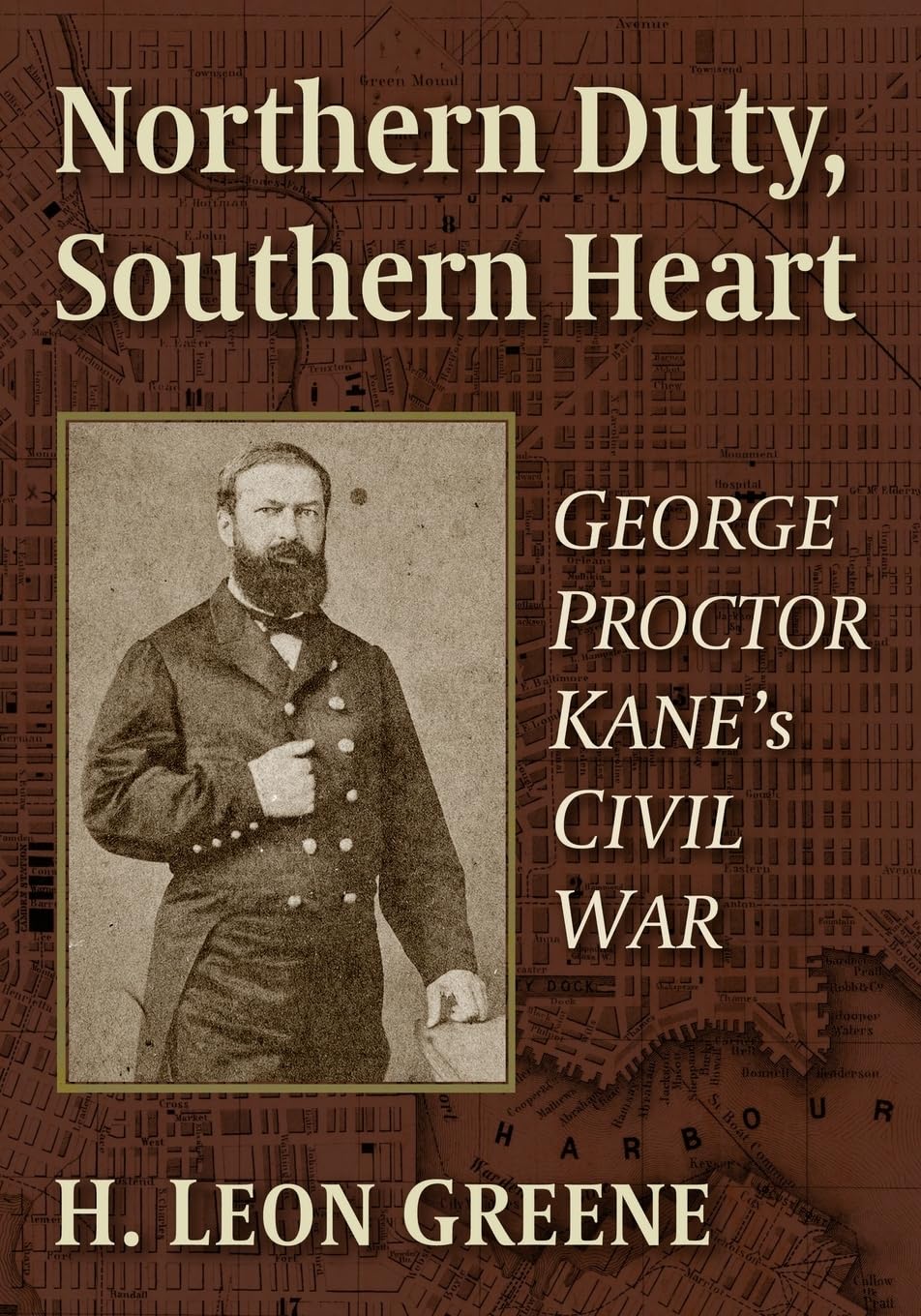Book Review: Northern Duty, Southern Heart: George Proctor Kane’s Civil War

 Northern Duty, Southern Heart: George Proctor Kane’s Civil War. By H. Leon Greene. Jefferson, NC: McFarland & Company, Inc., 2023. Softcover, 301 pp. $45.00.
Northern Duty, Southern Heart: George Proctor Kane’s Civil War. By H. Leon Greene. Jefferson, NC: McFarland & Company, Inc., 2023. Softcover, 301 pp. $45.00.
Reviewed by Aaron Stoyack
Leon Greene recounts the life of a Baltimore police chief in Northern Duty, Southern Heart: George Proctor Kane’s Civil War. Drama abounds within the pages, creating the feeling that one is reading a hybrid mystery-thriller that could result in substantial alterations to the coming conflict, even while knowing how history unfolds. This work outlines a critical component of the early war, perhaps underexamined due to its placement during the secession crisis before armed conflict erupted in earnest.
The introduction describes the book’s title, showing Kane as a lifelong Baltimorean who possessed southern leanings yet was compelled by his occupation as a lawman to perform duties for the North. Throughout, the author supports his claim that Kane was duty-bound and supported the Confederacy only after his tenure.
Kane faced allegations of involvement in a conspiracy to assassinate Lincoln before his inauguration, as well as neglect of his duties as Federal soldiers faced a riot when they passed through the city. After orchestrating the destruction of railroad bridges to prevent further troop movements and, thus, bloodshed, he was imprisoned without trial. Once released, Kane was lifted from law enforcement obligations and free to champion the southern cause.
This book is the second by Greene, a retired cardiologist, that dissects an alleged plot by Confederate sympathizers. It is preceded by The Confederate Yellow Fever Conspiracy: The Germ Warfare Plot of Luke Pryor Blackburn, 1864-65, which chronicled a Kentucky doctor’s efforts to send garments of yellow fever patients to northern states.
Greene’s work is the first biography of Kane and joins merely a handful of other sources mentioning him, pertaining to his alleged role in an assassination conspiracy and the circumstances of his imprisonment. Fifteen years after Michael J. Kline’s comprehensive treatise on the Baltimore Plot, and fourteen years after Harry A. Ezratty’s book on the Pratt Street Riot, Greene tracks a man playing a central role in both events. The lack of historiography surrounding Kane is partly evidenced in the bibliography, as the text pulls extensively from contemporary sources, chiefly newspapers.
The publication is divided into eighteen brief chapters, one of which is only two pages long. This format provides clear divisions as the narrative traverses numerous happenings within a short time frame. A multitude of maps accompany the text, all of which are remarkably well-marked by the author with legends and arrows. Thanks to these, the reader can immediately locate key features of the cityscape.
Greene writes for a knowledgeable audience yet provides a sufficient background of the principal controversies and calamities. Readers searching for an all-encompassing account of the harrowing events in 1861 may wish to look elsewhere due to the focus on Kane as an individual. The author takes time to cover a hole in the historiography in the opening chapters, describing Kane’s early life and business dealings. Yet the casual reader may find these passages to be of little value.
At times, Greene takes insinuations too far, as he claims, “The conclusion must be that Kane and [John Wilkes] Booth were acquaintances…” (26). This assertion is based on an impressive collection of circumstantial evidence that, while convincing, cannot be taken as confirmation.
Northern Duty, Southern Heart offers a unique examination of politics and violence in Baltimore through the story of a conflicted peacekeeper. Gangs, corruption, conspiracy, espionage, riots, political prisoners, and guerilla warfare are all featured prominently. If you seek an enthralling overview of these topics in 1861 Maryland and beyond, this book will keep readers guessing at every turn of the page.
Aaron Stoyack is a public historian, museum specialist and writer employed as a Park Ranger at Pamplin Historical Park. He graduated Summa Cum Laude from West Chester University with a B.A. in History and a Minor in Museum Studies. Aaron has served on local commissions and presented at regional and national public history and education conferences. He enjoys researching and interpreting all aspects of history, from local to global in scale.